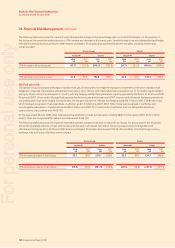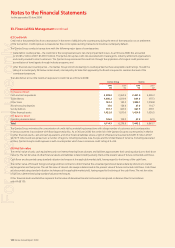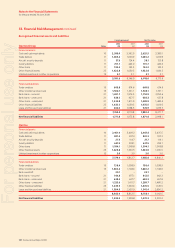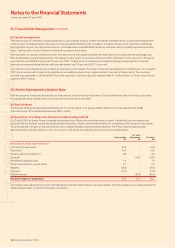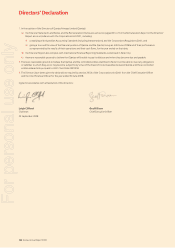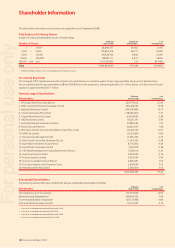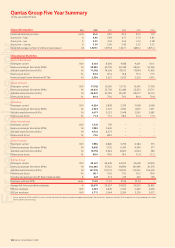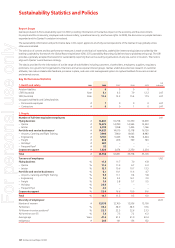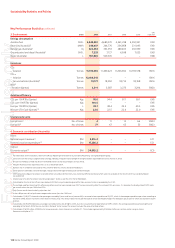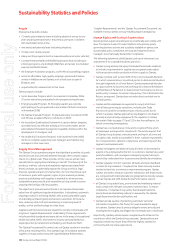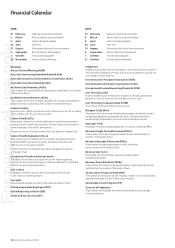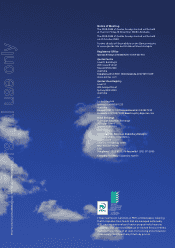Qantas 2008 Annual Report Download - page 151
Download and view the complete annual report
Please find page 151 of the 2008 Qantas annual report below. You can navigate through the pages in the report by either clicking on the pages listed below, or by using the keyword search tool below to find specific information within the annual report.149 Qantas Annual Report 2008
Sustainability Statistics and Policies
People
Employment benefi ts include:
12 weeks paid maternity leave (including adoption) and up to two
years unpaid parental leave for the primary care-giver, consistent
with Australian best practice;
one week paid paternity leave (including adoption);
10 days carer’s leave per year;
salary sacrifi ce programs (such as superannuation and motor vehicles);
a comprehensive Health and Wellbeing program that includes quit-
smoking programs, onsite Weight Watchers and access to scheduled
exercise and health classes;
the Employee Assistance program, a self-referral counselling program;
access to affordable, high-quality, employer-sponsored childcare
centres in Melbourne and Sydney, with a third soon to open in
Brisbane; and
opportunities for reduced cost air fare travel.
Talent programs include:
Senior Executive Program which commenced in December 2006.
25 senior executives participated in this program during the year;
Emerging Leader Program. 61 Emerging Leaders are currently
participating in the program and a new intake of 44 will commence
in November 2008;
the Qantas Graduate Program. 30 graduates were recruited in 2008
and 32 have accepted offers to commence in 2009;
the Australian Qualifi cations Framework is used to deliver targeted,
accredited and cost effective training to Front Line Leaders and an
externally benchmarked management capability framework for the
development of managers; and
the Leadership Transitions Program, to be launched in late 2008,
will focus on better supporting new managers and transitioning
managers to their new roles.
Supply Chain Management
The Qantas Group operations require that significant quantities of goods
and services are procured and delivered through often complex supply
chains on a global scale. These include common use as well as many
specialist items ranging from stationery to aircraft. The diversity of the
products, markets, cultures and regulatory regimes associated with
these purchases can potentially expose the Group to ethical, legal,
financial, operational and commercial risks. As more than 60 per cent
of revenue is spent with suppliers, rigour in procurement processes,
practices and dealings with suppliers is essential to achieve strong
sustainable business results and competitive pricing as well as sound
ongoing relationships with key suppliers.
The objective of procurement in Qantas is to maximise shareholder
value from all significant supplier relationships. A disciplined, systematic
ongoing process for achieving reliable, ethical and sustainable supply
of externally purchased goods and services is essential: At the same
time, reducing total costs and maintaining or improving levels of
quality, service and technology are a key focus.
Suppliers and their personnel are required to comply contractually with
a rigorous ‘Supplier Requirements’ undertaking. These requirements
include specified standards and expectations in the areas of occupational
health and safety (OHS), environment, security, personal behaviour,
equal opportunity, harassment and bullying, and fraud and theft.
The ‘Qantas Procurement Document’ sets out Qantas’ position in a number
of key areas including ethics, how Qantas buys, how Qantas assesses
suppliers, the approval process and Supplier/Qantas Relationships.
•
•
•
•
•
•
•
•
•
•
•
•
•
‘Supplier Requirements’ and the ‘Qantas Procurement Document’ are
available at www.qantas.com.au/ info/about/purchasing/policy.
Human Rights and Society’s Expectations
Qantas policies require all employees to act ethically and comply with
laws. The Qantas Code of Conduct & Ethics is the primary policy
governing business actions and is publicly available on qantas.com.
Qantas takes policy compliance seriously and requires all senior
managers to semiannually declare their compliance.
The following statements clarify Qantas’ policies of relevance to an
assessment of its sustainable business practices:
Qantas is progressively changing its standard terms and conditions
to include a requirement for suppliers to recognise human rights
in the acquisition and/or production of their supply to Qantas;
Qantas complies with section 305B of the Commonwealth Electoral
Act, which requires donors to political parties to disclose contributions
through lodgement of a Donor Return. Qantas representatives take
up opportunities for business networking and contact with Ministers
and Members of Parliament to make known the Group’s position on
public policy: however, to ensure transparency, this is disclosed in the
Return, as required. Qantas does not make direct contributions to
political parties;
Qantas and its employees are expected to comply at all times
with all laws governing its operations, including the Trade
Practices Act and the competition laws of every jurisdiction in
which it operates. Qantas approaches any allegation of a breach
seriously and proactively engages with the regulator to resolve
the matter. Refer to pages 113 and 123 in this Annual Report, for
details on existing investigations;
Qantas has a comprehensive Crime and Corruption Policy which
all employees are required to comply with. The policy requires that
all Qantas Group business units document and report all crime and
corruption risks and be accountable for them. It places responsibility
for crime prevention, detection, deterrence and reporting with the
segment and business units;
Qantas investigates and takes seriously all claims of discrimination
against or by employees/contractors or customers. Qantas has a solid
policy foundation, with managers undergoing regular training to
ensure they understand how to prevent and identify discrimination;
Qantas regularly monitors customer attitudes and seeks feedback
on areas for improvement. Complaints are taken seriously and are
tracked to feed into a continuous improvement program. Qantas
surveys are used to measure customer satisfaction and these results
are compared with internationally recognised airline industry surveys,
such as Skytrax and IATA Global Airline Performance reports;
all Qantas Group advertising, promotional and marketing material
must comply with relevant consumer protection laws. To ensure
compliance, it is Qantas Group policy that all advertisements,
promotional and marketing material is reviewed by the Qantas
Legal Department before publication; and
Qantas has had a policy of protecting customers’ personal
information long before the Privacy Act was amended to apply
to business. Qantas takes its privacy obligations very seriously and
investigates thoroughly any allegations of wrongful use or disclosure.
Importantly, Qantas policies require compliance with all laws in the
countries in which the Qantas Group operates. Qantas policies are
regularly reviewed to ensure they refl ect the highest standard in
community and corporate expectations.
•
•
•
•
•
•
•
•
For personal use only


